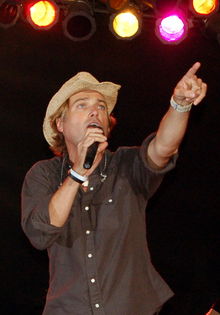Contemporary Christian music


Contemporary Christian music (or CCM—and occasionally "inspirational music") is a genre of modern popular music which is lyrically focused on matters concerned with the Christian faith. Today, the term is typically used to refer to the Nashville, Tennessee-based pop, rock, and worship Christian music industry, currently represented by artists such as Avalon, BarlowGirl, Jeremy Camp, Casting Crowns, Steven Curtis Chapman, David Crowder Band, Amy Grant, Natalie Grant, Jars of Clay, MercyMe, Newsboys, Michael W. Smith, Rebecca St. James, Third Day, tobyMac, and a host of others.
The industry is represented in Billboard Magazine's "Top Christian Albums" and "Hot Christian Songs" charts,[1] and by Radio & Records magazine's Christian AC (Adult Contemporary), Christian CHR (Contemporary Hit Radio), Christian Rock, and Inspirational (INSPO) airplay charts,[2] as well as the iTunes Store's "Christian & Gospel" genre.[3]
However, not all modern music which lyrically identifies with Christianity is part of the Nashville Contemporary Christian Music industry.[4] Alternative genres such as punk, hardcore, and holy hip-hop groups deal explicitly with issues of faith but are normally not considered CCM. Also, several mainstream artists such as The Byrds, Bob Dylan, Van Morrison, Elvis Presley, Lifehouse, U2, and rapper DMX have dealt with Christian themes in their work but are not part of the CCM industry.[4]
Contents |
History
The genre that would eventually be known as Contemporary Christian music, officially came from the Jesus movement revival of the latter 1960s and early 1970s, and was originally called "Jesus music". "About that time, many young people from the sixties' counterculture professed to believe in Jesus. Convinced of the bareness of a lifestyle based on drugs, free sex, and radical politics, 'hippies' became 'Jesus people'" [5]. Of course there were people who felt like Jesus was another "trip",[6] It can be assumed that many people took it seriously and revivals sprang forth. When such awakenings happened new music became popular. "The 'Jesus Movement' of the 1970s was when things really started changing and Christian music began to become an industry within itself."[7] "Jesus Music" started by playing instruments and singing songs about love and peace, which then translated into love of God. Paul Wohlegemuth, who wrote the book Rethinking the Church said, "[the] 1970s will see a marked acceptance of rock-influenced music in all levels of church music. The rock style will become more familiar to all people, its rhythmic excesses will become refined, and its earlier secular associations will be less remembered."[8]
Though there were Christian albums in the 1960s that contained contemporary-sounding songs, there were two albums recorded in 1969 that are considered to be the first complete albums of "Jesus rock": Upon This Rock (1969) by Larry Norman initially released on Capitol Records, and Mylon, We Believe by Mylon LeFevre, released by Cotillion, which was LeFevre's attempt at blending gospel music with Southern Rock.[9] Unlike traditional or southern gospel music, this new Jesus music was birthed out of rock and folk music.[10]
The pioneers of this movement also included 2nd Chapter of Acts, Andraé Crouch and the Disciples, Evie, Nancy Honeytree, The Imperials, Love Song, Barry McGuire, and Petra. The small Jesus music culture had expanded into a multi-million-dollar industry by the 1980s. Many CCM artists such as Amy Grant, dc Talk, Michael W. Smith, Stryper, and Jars of Clay found crossover success with Top 40 mainstream radio play. As of 2005, Christian music sales exceed those for classical, jazz, Latin, New Age, and soundtrack music [11].
Controversy
Contemporary Christian music has been a topic of controversy in various ways since its beginnings in the 1960s.[4] The Christian college Bob Jones University prohibits its dormitory students from listening to CCM.[12] Others simply find the concept of Christian pop/rock music to be an unusual phenomenon, since rock music has historically been associated with themes such as sexual promiscuity, rebellion, drug and alcohol use, and other topics normally considered antithetical to the teachings of Christianity.[4] This controversy caused by evangelical pop music was explored by Gerald Clarke in his TIME magazine article "New Lyrics for the Devil's Music". Southern California radio first programmed Contemporary Christian music with Paul John Toberty pioneering 24-hours of music programming, and the juxtaposition of rock and roll with preaching the Gospel did not stop Toberty's KYMS from reaching the top of the ratings in 1991 for Orange County music with the first all Contemporary Christian music format[13].
In her article, Kim Jones explores this change in the face of Christian music saying, "Up until the late 1960s, Christian music invoked images of church, hymnals and organs. The face of Christian music has spent the last 30+ years evolving and growing. Pipe organs have been set aside for electric guitars and drums…People who enjoy Contemporary Christian Music, want to feel like God is here and now, not some dusty relic from the dark ages that can't possibly understand the issues of today" [7]
Contemporary Christian musicians and listeners have sought to extend it into settings where religious music traditionally might not be heard. "Christian music has extended from the church to the radio, television, concert halls and huge rallies and festivals." [7] MercyMe's song I Can Only Imagine was a crossover success despite having a clear Christian message.
Paul Baker, author of Contemporary Christian Music, addressed the question, "Is the music a ministry, or is it entertainment? Opinions were as varied as the people expressing them. One fact must be brought out, however. The motives, on both sides, were nearly always sincere and well intentioned, rarely malicious." [14]
"The responsibility of the church is not to provide escape from reality," according to Ellsworth, the author of Christian Music in Contemporary Witness, "but to give answers to contemporary problems through legitimate, biblical means. The lighter, softer rock styles still allow for the communication of the text." [15] The biblical lyrics in CCM relate to more recent problems we might be facing in today's society.
Top 5 best selling albums
| Rank | Artist | Album | Billboard 200 |
Sales | Certification |
|---|---|---|---|---|---|
| 1 | Amy Grant | Heart in Motion | 10 | 5,000,000 | 5x Platinum |
| 2 | Michael W. Smith | Worship | 20 | 2,000,000 | 2x Platinum |
| 3 | Amy Grant | House of Love | 13 | 2,000,000 | 2x Platinum |
| 4 | Steven Curtis Chapman | Speechless | 31 | 1,150,000 | Platinum |
| 5 | Casting Crowns | Lifesong | 9 | 1,000,000 | Platinum |
See also
- Christian rock
- Contemporary worship
- Christian metal
- Christian alternative rock
Notes
- ↑ "Best Selling Christian Singles and Albums". Billboard Magazine. http://www.billboard.com/bbcom/charts/christian_gospel_index.jsp. Retrieved 2007-02-28.
- ↑ R&R - Radio & Records, Inc
- ↑ In the US iTunes store, the section is entitled Christian & Gospel. In the UK iTunes store, it's Gospel. Canada's and Australia's iTunes section is entitled Inspirational.
- ↑ 4.0 4.1 4.2 4.3 Powell, Mark Allan (2002). Encyclopedia of Contemporary Christian Music (First printing ed.). Peabody, Massachusetts: Hendrickson Publishers. pp. 10–13. ISBN 1-56563-679-1.
- ↑ Frame, John M. Contemporary Worship Music. Phillipsburg, NJ: P&R Publishing, 1997.
- ↑ John M. Contemporary Worship Music. Phillipsburg, NJ: P&R Publishing, 1997.
- ↑ 7.0 7.1 7.2 Jones, Kim. "The Changing Face of Christian Music". About.com. http://christianmusic.about.com/od/trivia/a/ccmhistory.htm. Retrieved March 31, 2010.
- ↑ Baker, Paul. Page 140. Contemporary Christian Music: Where it came from What it is Where It's Going. Westchester, Illinois: Crossway Books, 1985. Print.
- ↑ Oord, Bill. "Mylon LeFevre Biography". http://www.tributetomylon.com/biography.htm. Retrieved 26 June 2010.
- ↑ Di Sabatino, David (1999). The Jesus People Movement: an annotated bibliography and general resource. Lake Forest, CA: Jester Media. p. 136.
- ↑ http://christianmusic.about.com/od/christianmusicmonthly/a/aaWeberStats105.htm
- ↑ "BJU ~ Residence Hall Life". Bob Jones University. http://www.bju.edu/become-a-student/accepted-students/expectations/residence.php. Retrieved 2009-03-21.
- ↑ http://www.time.com/time/magazine/article/0,9171,141289,00.html
- ↑ Baker, Paul. Page 133. Contemporary Christian Music: Where it came from What it is Where It's Going. Westchester, Illinois: Crossway Books, 1985. Print.
- ↑ Ellsworth, Donald. Christian Music in Contemporary Witness: Historical Antecedents and Contemporary Practices. Grand Rapids, Michigan: Baker Book House, 1979. Print.
Further reading
- Alfonso, Barry. The Billboard Guide to Contemporary Christian Music. Billboard Books, 2002.
- Beaujon, Andrew (2006). Body Piercing Saved My Life: Inside the Phenomenon of Christian Rock. Cambridge, Massachusetts: Da Capo Press. ISBN 0-306-81457-9. http://www.bodypiercingsavedmylife.com/.
- Di Sabatino, David (1999). The Jesus People Movement: An Annotated Bibliography and General Resource. Bibliographies and Indexes in Religious Studies, Number 49. Westport, CT: Greenwood Press. ISBN 0313302685.
- Du Noyer, Paul (2003). "Contemporary Christian Music". The Billboard Illustrated Encyclopedia of Music. New York City: Billboard Books. pp. 422–423. ISBN 0-8230-7869-8.
- Granger, Thom (2001). CCM Presents: The 100 Greatest Albums in Christian Music. Nashville: CCM Books.
- Hendershot, Heather (2004). "Why Should the Devil Have all the Good Music? Christian Music and the Secular Marketplace". Shaking the World for Jesus: Media and Conservative Evangelical Culture. Chicago, Illinois: University of Chicago Press. ISBN 0-226-32679-9.
- Howard, Jay R; Streck, John M. (1999). Apostles of Rock: The Splintered World of Contemporary Christian Music. Lexington, Kentucky: The University of Kentucky Press. ISBN 081319086X.
- Joseph, Mark (1999). The Rock and Roll Rebellion: Why People of Faith Abandoned Rock Music-- And Why They're Coming Back. Nashville: Broadman & Holman.
- Joseph, Mark (2003). Faith, God & Rock 'n' Roll. London: Sanctuary.
- Kyle, Richard (2006). "If You Can't Beat 'em Join 'em". Evangelicalism : an Americanized Christianity. New Brunswick, New Jersey: Transaction Publishers. pp. 281–286. ISBN 0-7658-0324-0.
- Lucarini, Dan. Why I left the Contemporary Christian Music Movement. Evangelical Press.
- Miller, Steve (1993). The Contemporary Christian Music Debate. Tyndale House.
- Mount, Daniel J. (2005). A City on a Hilltop? The History of Contemporary Christian Music. Lulu.
- Powell, Mark Allan (2002). Encyclopedia of Contemporary Christian Music. Peabody, Massachusetts: Hendrickson Publishers. ISBN 1-56563-679-1.
- Pruitt, Jim (2003). Contemporary Christian Musician's Survival Manual. Lulu. ISBN 1-4116-0117-3. http://www.cyshift.com/jarc/ccmsm.html.
- Romanowski, William D. Eyes Wide Open: Looking for God in Popular Culture. Brazos Press, 2001.
- Young, Shawn David, Hippies, Jesus Freaks, and Music (Ann Arbor: Xanedu/Copley Original Works, 2005. ISBN 1-59399-201-7.
External links
- Contemporary Christian Music (CCM) Magazine
- What Would Jesus Listen To? Christian Electronic and Dance Music Review
- Christian Music Monthly
- lightvox | Christian Music Magazine Collaborative Christian Music Magazine
- Contemporary Christian Music Songs by Topic
- Mind Garage: 1969 Article on first US televised rock and roll worship service
[1]Frame, John M. Contemporary Worship Music. Phillipsburg, NJ: P&R Publishing, 1997.
[2]Miller, Steve. The Contemporary Christian Music Debate. Wheaton, Il: Tyndale House Publishers, Inc. 1993.
|
|||||||||||||||||||||||||||||||||||
